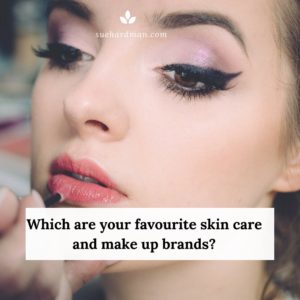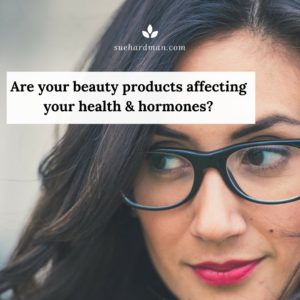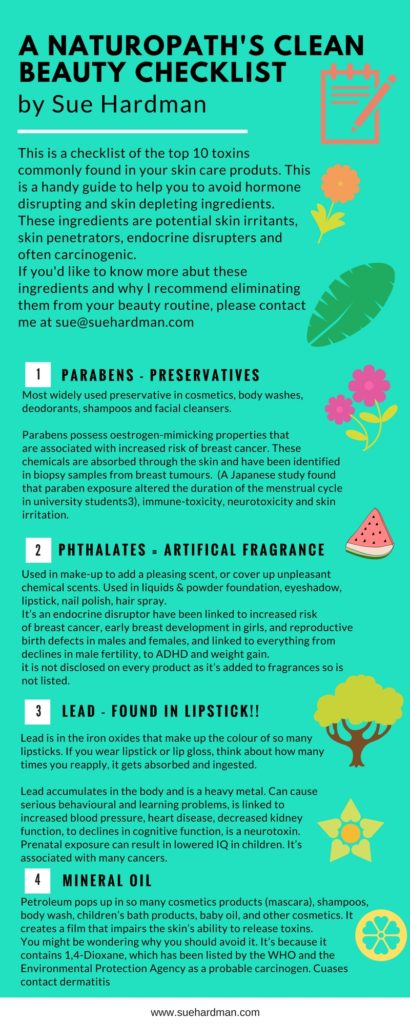Cleaning Up Your Beauty Regime
I’m pretty choosy about my personal care products.

When I first learned about what was lurking in my products there wasn’t a whole lot of choice out there.
Fortunately, it’s becoming easier and easier to find products free of the ‘nasties’ that can contribute to many health issues.
I sometimes make my own – I especially like make nourishing facial oils.
Over the last few years there’s been an explosion in this space as more and more companies are creating cleaner lines in response to a growing interest in wellness and a greater scrutiny of questionable ingredients.
Why skincare?
Because our skin is our largest organ, and is also one of our 6 organs of detoxification.
And because sooooo … many of the chemicals that are used in products intended for the skin (think: lotions, shower products, make up, etc.) are made with chemicals that can negatively affect our health.
Do you know why the things that we put on our skin matters so much? I wanted to be sure that you have the knowledge to make healthier choices when you next choose what personal care products you’re going to buy.
We’re often more concerned with what we put IN our body, than what we put ON our body but this month I wanted to talk about what you put on your skin whether it’s – shampoo, moisturiser, deodorant or makeup.
Why, you may ask?
Many ingredients are known to be hormone disruptors and carcinogens. While manufacturers may claim these ingredients are safe in small amounts. The concern is that you’re exposed to so many toxins in our environment, we have no idea on the accumulative effect, so why add more fuel to the fire.
Many of the ingredients in skin care products penetrate your skin and end up in your bloodstream.
The EU has banned over 1000 cosmetic ingredients, but the FDA says safety for personal care products is the responsibility of the manufacturer. That’s not reassuring… So, it’s really up to you, the consumer, to become proactive.
The average person is exposed to 126 unique chemicals in their personal care products alone, every day (US data). Now consider that your skin is your body’s largest organ, and is permeable to many synthetic chemicals that we come in contact with daily. And studies have shown many of these chemicals do not break down, but simply accumulate in your body.
And that makes sense since it’s very literally, and obviously going inside us and working its way through our body.
When we consume things orally they enter our digestive tract, where they get absorbed, and then work their way over to the liver through the hepatic portal vein.
Our liver is the workhorse of the metabolic process. This special organ is unique in that it has two separate blood supplies. One of these creates a closed loop; things enter the bloodstream, pass through the heart and make their way to the liver to be metabolised or broken down.
After those things, harmful or otherwise, are filtered out and metabolised through the liver, the blood returns to circulation, and makes it’s way back to the heart, and the cycle continues.
The second blood supply comes directly from the digestive system.
Things that we ingest hit the liver and get metabolised before making their way into the blood supply, which is a good thing.
This is called First Pass Metabolism and it simply means that the liver gets a chance to metabolise the chemical, compound, nutrient, whatever it is, first.
So what does this have to do with skin?
Chemicals, compounds, etc, that enter the body through absorption from the skin, and through inhalation actually bypass this First Pass Metabolism.
They move through the bloodstream before eventually making their way to the liver to be metabolised.
So, even though the amount of chemicals we absorb can be significantly less than those we ingest, the fact that they bypass that initial metabolism can mean that those exposures can be more detrimental.
This is why our skin care matters!
While first pass metabolism might be technical, explaining this concept can help you see why shifting to safer skin care is so important.
People are often feel conflicted about whether they should use up what they have, or toss everything and buy all new stuff.
I say take it one step at a time! When something runs out, replace with a better, safer version.
 Skincare products (makeup, deodorant, cleansers, body wash and shampoos) are often full of chemicals, some which come with a known health risk.
Skincare products (makeup, deodorant, cleansers, body wash and shampoos) are often full of chemicals, some which come with a known health risk.
Parabens, for example, you may have noticed have been phased out of skin care products lately, with your favourite products now boasting they are “Now Paraben Free” – meaning that a lot of them, once upon a time, did include parabens.
Parabens have been phased out because they’ve been found to mimic oestrogen and are of concern for the formation of oestrogenic cancers, such as breast cancer.
Because skincare is applied directly to the skin, a lot of it is absorbed into your bloodstream, so all of those unknown chemicals have a direct pathway to your liver.
So, how do you reduce your toxin load and protect your skin from damage?
- Firstly, I’d advise you to use things up before you buy a new product – no need to be wasteful.
- Educate yourself. Find out what chemicals you should be avoiding and why and it’ll make it easier for you to avoid them.
- Look up recipes to make your own products and give them a go! There are natural shampoo and conditioner solutions, cleansers, masks and even toothpaste you can try if you are keen.
- Choose products that have less chemicals it might take a bit of trial and error but it will be worth it in the long run. Your worth it (who says that again!!);
